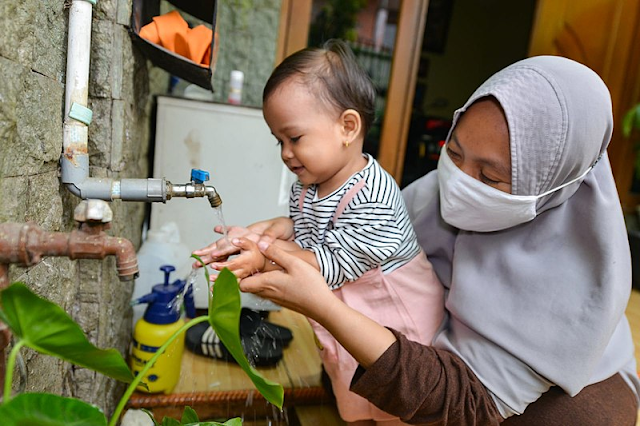Widespread custom: handwashing (Indonesia) (2021)
(credit: Achmad Wibisono, via Wikimedia Commons)
9. The Roots of Religion
Note also that very general values, etc. –
if they get reliable results over the long haul of generations – are the ones most
carefully saved and passed on in a tribe. This makes sense. Concepts of greater
generality, if they have been proven to work, may be used as guides more often in
more decision situations to enable the tribe to survive more of the time than
is the case for their competitor tribes. But the reasons why they work are
often too buried among reams of irrelevant sense data and sense data memories
for tribe members to see the large patterns which show how these concepts,
values, customs, and morés
work. Thus slow-working concepts get turned, by cultural evolution, into religion
in the tribe’s cultural programming package. Beliefs accepted without logical
explanation.
Or to put the matter another way, in the
past, very general concepts, values, etc. became more and more deeply entrenched
in the tribe’s myths if, in the first place, they worked to improve the tribe’s
survival odds, but also, in the second place, if the reasons why they worked
couldn’t be explained in everyday terms by the tribe’s shaman. These were so
important that they needed to be retained and followed consistently in practice
by tribe members. But to be retained in the tribe’s lore, they had to be
gradually turned into beliefs that tribe members had to take on faith so that they
were followed without question. Such beliefs, along with their attached
behaviors, were assiduously adhered to, even during times when the beliefs and values
might appear ineffective for a while.
In this way, these pieces of wisdom became
myths. Any tribe that didn’t have these very general, but effective, apps in
some form in its culture, eventually fell behind its competition and died out.
For example, some early tribes gradually
learned to value cleanliness. We didn’t have to know about germs to come to
value cleanliness. It worked; it made more of the tribe survive longer so we
kept it, even when we didn’t know why we kept it. Or in another example, cooking
food. When a tribe first began to cook food, it probably happened just due to
curiosity on the part of one tribe member who held a piece of meat on a stick
over the campfire to see what would happen.
At first, most of the tribe likely didn’t think cooked meat was tasty. They were used to raw meat, and cooking it took longer. But the tribe that cooked its meat got sick less often. Soon, cooking became familiar for at least a few tribes, and these outbred other tribes with whom they competed, then drove them out of the area. Thus, over generations, hard experience, including loss of lives, turned some tribe’s ways toward washing and cooking as less clean tribes died out.
Ruins of Ancient Roman baths, Santorini, Greece
(credit: Wikimedia Commons)
Over many generations, a few tribes came
to adopt daily rituals of cleanliness and cooking because their cleaner ways
led them to survive in greater numbers than their competition. Consciously, they
believed their religion required these practices. Below conscious choice, their
beliefs led them first, to outbreed, then, to outnumber, and then, to outfight
less clean neighbors.
Hestia was the ancient Greek goddess of cooking
and the home. Hygeia was the goddess of cleanliness. So, you cook and wash. Why?
For the Ancient Greeks, it was because the gods said so. In time, for reasons they
little understood, they defeated less clean tribes and took their land. Analogous
beliefs existed in many cultures, including Hindu, Buddhist, Muslim, etc. They
bathed and cooked.
All of this occurred even though likely none
of those involved knew anything about germs. (“Invisible little animals! Absurd!”)
In this way, effective beliefs and customs get embedded in culture by becoming myths.
Like Hestia.
In short, tribes that survive keep alive
the beliefs and customs that keep them alive. Especially revered are the very
general beliefs that significantly improve a tribe’s survival rates over the
long haul of generations.



No comments:
Post a Comment
What are your thoughts now? Comment and I will reply. I promise.